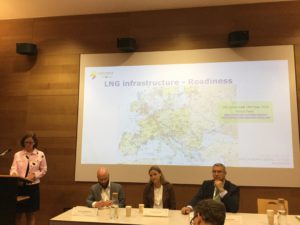GasNaturally at EUSEW – LNG in shipping
GasNaturally co-organised a panel debate about sustainable shipping in the framework of the EU Sustainable Energy Week on 20 June 2019.
The event tilted "Sailing Towards Paris: Can Shipping be Zero-Emissions?" was held in the Berlaymont building and gathered the industry experts, policy-makers and NGO representatives, attracting around 60 partcipants.

Speaking in the 'short-sea' panel moderated by Director M. Kopczynska from DG MOVE, Francisco De la Flor, Director in Enagas (member of Gas Infrastructure Europe) made the following key points on behalf of GasNaturally:
- LNG is the most environmentally-friendly, readily available fuel for shipping today and in the foreseeable future. Compared to conventional fuels it provides up to 21% reduction in GHG emissions, which could go up to 91% reduction in a scenario with renewable gases (bioLNG);
- LNG provides a major advantage in terms of improving air quality and human health. Compared to conventional fuels it reduces emission of SOx by 100%, NOx by 95% and particulate matter (PM) by up to 99%;
- Compared to other alternatives (hydrogen, methanol) the readiness of LNG infrastructure is a distinct advantage, with 216 operational small-scale LNG terminals spread across Europe.
Read more in the latest Thinkstep study “Life Cycle GHG Emission Study on the Use of LNG as Marine Fuel” and check the latest small-scale LNG map from our member GIE.

Tom Strang, Senior Vice President for Maritime Affairs at a global cruise ship operator Carnival Corporation, spoke in the ‘deep-sea’ panel moderated by Damien Meadows from DG Climate.
Mr Strang reiterated the value of LNG as the best, most widely available fuel today that enables the compliance of the ‘deep-sea’ shipping industry with current regulations.
- Carnival sees LNG as a long-term transition fuel. Out of 21 newly ordered ships, 10 will be LNG-powered. The use of LNG provides opportunities to look at introduction of bio and synthetic fuels in the long-term perspective;
- Carnival has reached its 2020 target to cut the intensity of its CO2-equivalent emissions by 25% compared with 2005 levels, and the company is also on track to cut its carbon intensity by 40% compared with 2008 by 2030, in line with the targets of the International Maritime Organisation;
- Looking into the future, Carnival is investigating options of blending in the renewable bio/ synthetic liquid hydrogen to improve carbon footprint, as well as looking at alternatives such as liquid hydrogen and ammonia. The current problem is lack of infrastructure to deliver these alternatives.
Other speakers presented interesting updates on hydrogen fuel cell projects (see the ABB presentation) and the concept of a ‘multi fuel port’ where fuels like methanol, hydrogen, LNG and electric power could become fully integrated. (see the Port of Antwerp presentation).